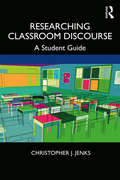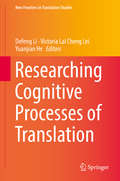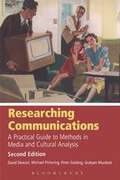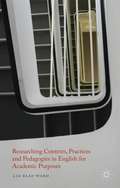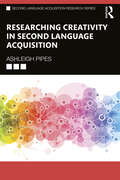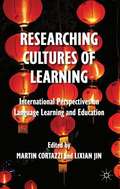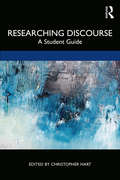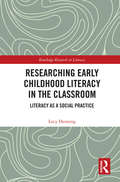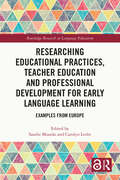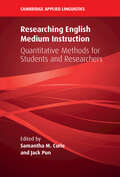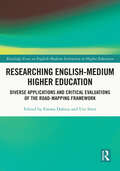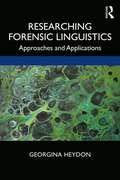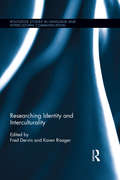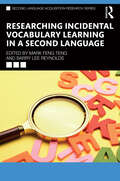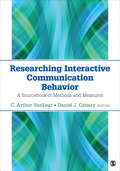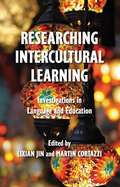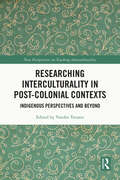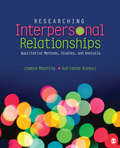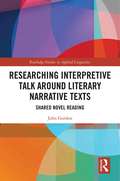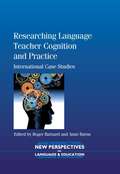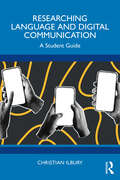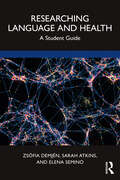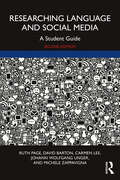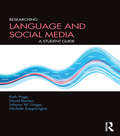- Table View
- List View
Researching Classroom Discourse: A Student Guide
by Christopher J. JenksThis practical guide to doing classroom discourse research provides a comprehensive overview of the research process. Bringing together both discourse analysis and classroom discourse research, this book helps readers to develop the analytic and rhetorical skills needed to conduct, and write about, the discourse of teaching and learning. Offering step-by-step guidance, each chapter is written so that readers can put the theoretical and methodological issues of classroom discourse analysis into practice while writing an academic paper. Chapters are organized around three stages of research: planning, analyzing, and understanding and reporting. Reflective questions and discourse examples are used throughout the book to assist readers. This book is essential reading for modules on classroom discourse or thesis writing and a key supplementary resource for research methods, discourse analysis, or language teaching and learning.
Researching Cognitive Processes of Translation (New Frontiers in Translation Studies)
by Defeng Li Victoria Lai Lei Yuanjian HeThis edited volume covers an array of the most relevant topics in translation cognition, taking different approaches and using different research tools. It explores theoretical and methodological issues using case studies and examining their practical and pedagogical implications. It is a valuable resource for translation studies scholars, graduate students and those interested in translation and translation training, enabling them to conceptualize translation cognition, in order to enhance their research methods and designs, manage innovations in their translation training or simply understand their own translation behaviours.
Researching Communications: A Practical Guide to Methods in Media and Cultural Analysis
by Michael Pickering Graham Murdock David Deacon Peter GoldingThe new edition of the highly respected Researching Communications is a comprehensive and authoritative guide to researching media and communication. Introducing the major research methods, giving detailed examples of research analysis and practical step-by-step guidance in clear language, Researching Communications, Second Edition is an invaluable guide to performing and analyzing research tasks. Written by highly regarded experts in the field, the new edition includes expanded and updated sections on the Internet, online databases and the latest CAQDAS packages, as well as new case studies, international examples, and details of recent developments in media and communication studies. Undergraduate and postgraduate media- and communication-studies students will find Researching Communications an invaluable resource at all stages of their course.
Researching Contexts, Practices and Pedagogies in English for Academic Purposes
by Lia Blaj-WardThis book is a point of reference for EAP professionals planning to conduct or commission research into learning, teaching, professional development or quality assurance in EAP. It draws on academic and professional debates to inspire further research and practical initiatives to enhance EAP provision.
Researching Creativity in Second Language Acquisition (Second Language Acquisition Research Series)
by Ashleigh PipesResearching Creativity in Second Language Acquisition explains the links between creativity and second language learning and how to propel the research of creativity as an individual difference in second language acquisition forward at multiple levels. It features an array of sample research questions and methods for student and professional researchers, ranging from simple projects that can be executed from start to finish in 15 weeks all the way to multi-year project guidelines for more advanced scholars with additional time and resources. It also features in-class and out-of-class activity suggestions that will reinforce concepts in fun and creative ways. Using this book as a guide will save researchers time and effort in designing and executing their next projects as well as save instructors time in class planning. This book will be an invaluable resource to students and researchers of SLA, applied linguistics, TESOL, and psychology.
Researching Cultures of Learning
by Lixian Jin Martin CortazziThis edited book examines cultures of learning from the perspectives of education, applied linguistics and language learning. The concept can be used to explore socio-cultural features of language learning and use contexts in educational institutions, and cultural practices of pedagogic activities and classroom interaction.
Researching Discourse: A Student Guide
by Christopher HartThis book offers a ‘how-to’ guide to conducting research in discourse analysis. Organised around different approaches to discourse analysis and working with different types of discourse data, the book will help students answer questions such as: Which approach should I take? What kind of data should I analyse and how do I set about collecting it? What consideration should I give to ethics? How do I make my analyses systematic and rigorous? How do I report my findings? Both qualitative and quantitative (corpus-based and experimental) methods are covered. Illustrated with far-ranging, detailed, and original case-studies, each chapter follows a consistent format that takes readers step by step through the research process, from design to implementation and presentation. Chapters can be read independently of one another. This is the ideal companion for any student undertaking research in discourse analysis within English language, linguistics, applied linguistics, and communication studies programmes.
Researching Early Childhood Literacy in the Classroom: Literacy as a Social Practice (Routledge Research in Literacy)
by Lucy HenningThis volume demonstrates how the ethnographic approach to research demanded by a ‘Literacy as Social Practice’ perspective can generate fresh insights into what happens when young children engage with schooled literacy tasks. Researching Early Childhood Literacy in the Classroom argues that the lived experience of young children encountering formal schooled literacy curricula should be the foremost consideration in educational reforms intended to improve rates of literacy acquisition in schools. To make this argument, the author suspends traditional concerns with ‘learning’ and ‘progress’ to concentrate on ‘practice’ and ‘meaning’ in a careful analysis of key classroom incidents. The author concludes that such insights suggest a need for re-considering the assumptions upon which educational policy rests. This book will be of great interest to graduate and postgraduate students, researchers, academics, and libraries in the fields of Literacy Studies, Teacher Education, Education Policy and Applied Linguistics.
Researching Educational Practices, Teacher Education and Professional Development for Early Language Learning: Examples from Europe (Routledge Research in Language Education)
by Sandie Mourão Carolyn LeslieRecognising the urgent need for further progress in teacher education and preparation for the success of early language learning, this volume presents research on the education and professional development of teachers, exploring how they can foster multilingual spaces in the early years of formal education.Investigating a range of European contexts, the book examines the effectiveness of teacher education for early language learning, covering contexts of multilingualism and English as a foreign language (EFL) with children under the age of 12. Split into three parts examining research into teacher practices, education, and curricula, chapters cover emerging topics such as teacher education and local linguistic encounters; global citizenship and transcultural education; linguistic landscapes and visual narratives; mixed-age classrooms and literacy skills; pre-service and in-service teacher education; and teacher and teacher educator competencies and beliefs.Offering a unique combination of foci on teachers, teacher education and classroom practice, this book will be of great interest to researchers and postgraduate students in the fields of early language education, multilingualism, EFL and teacher education more broadly. Student teachers and teachers working in early language learning contexts may also find the volume of interest.Introduction, Chapters 7, 11, 12 and 13 of this book is freely available as a downloadable Open Access PDF at http://www.taylorfrancis.com under a Creative Commons Attribution-Non Commercial-No Derivatives (CC-BY-NC-ND) 4.0 license.
Researching English Medium Instruction: Quantitative Methods for Students and Researchers (Cambridge Applied Linguistics)
by Samantha M. Curle Jack PunIn the rapidly evolving landscape of English Medium Instruction (EMI), the need for comprehensive research methodologies has never been more pronounced. This pioneering guide offers an in-depth exploration into quantitative research methods tailored specifically for EMI. Going beyond the surface, the volume bridges the cultural divides of East and West, ensuring that insights are inclusive of diverse educational levels, settings, and backgrounds. Whether you're an academic researcher, a policy-maker, or an educator in the field, this book serves as an invaluable resource. Not only does it fill a notable gap in the literature, it also presents readers with practical, adaptable research strategies that can be employed globally, and is illustrated with a range of case studies that bring the methods to life. Understand the nuances of EMI across different contexts, and equip yourself with the tools needed to contribute meaningfully to the discourse on global EMI practices, challenges, and solutions.
Researching English-Medium Higher Education: Diverse Applications and Critical Evaluations of the ROAD-MAPPING Framework (Routledge Focus on English-Medium Instruction in Higher Education)
by Ute SmitSet against the increasing use of English-medium higher education across the world, this book brings together researchers and practitioners who, despite coming from very different geopolitical areas and pursuing distinct research objectives, coincide in their use of the ROAD-MAPPING conceptual framework. With the use of this framework and its six interrelated dimensions, the nine studies included in this volume explore key topics for English-Medium Education in Multilingual University Settings (EMEMUS) from diverse perspectives. These range from multi-sited, meta-level approaches critically analysing different countries and their realisations of EMEMUS to using ROAD-MAPPING as a methodological tool to analyse all its dimensions or place the lens on a particular aspect. By doing so, the contributions demonstrate the strength of the ROAD-MAPPING framework for investigating and understanding the complex nature of EMEMUS. The volume makes a valuable contribution to the development of EMEMUS research and is thus highly recommended for scholars, policymakers and students interested in one of the most fast-growing (and contested) research areas in applied linguistics today.
Researching Forensic Linguistics: Approaches and Applications
by Georgina HeydonResearching Forensic Linguistics is an informative, hands-on guide to conducting research in forensic linguistics that can underpin legal and justice practices and address social justice problems involving language. Georgina Heydon takes readers step by step through the research process using case studies that draw on different types of forensic and legal language data such as police interviews, anonymous reports of sexual assault, threatening letters and justice stakeholder interviews. Each chapter is framed by a language problem arising from either forensic linguistic case work or a key issue in language and the law. Up-to-date research methods in forensic linguistics are presented, including authorship attribution using online corpora, practice-based linguistic analysis and experimental techniques. This is an ideal companion for linguists who want to apply their skills to a forensic setting, practitioners in the legal and justice fields seeking to understand how linguistic analysis can support their work, and any student undertaking research in forensic linguistics within English language, linguistics, applied linguistics and legal studies.
Researching Identity and Interculturality (Routledge Studies in Language and Intercultural Communication #3)
by Fred Dervin Karen RisagerThis volume focuses on advances in research methodology in an interdisciplinary field framed by discourses of identity and interculturality. It includes a range of qualitative studies: studies of interaction, narrative studies, conversation analysis, ethnographic studies, postcolonial studies and critical discourse studies, and emphasizes the role of discourse and power in all studies of identity and interculturality. The volume particularly focuses on critical reflexivity in every stage of research, including reflections on theoretical concepts (such as ‘identity’ and ‘interculturality’) and their relationship with methodology and analytical practice, reflections on researcher identity and subjectivity, reflections on local and global contexts of research, and reflections on language choice and linguacultural aspects of data generation, analysis and communication.
Researching Incidental Vocabulary Learning in a Second Language (ISSN)
by Mark Feng Teng Barry Lee ReynoldsIncidental language acquisition is the language that is learned informally, outside the constraints of the typical classroom, and vocabulary is one of the key elements in language learning and knowledge. This unique text is the first comprehensive overview and hands-on methodological guide for researching second language (L2) incidental vocabulary acquisition.Expert contributors from around the world synthesize the state of the art by defining key concepts and laying out the major theoretical perspectives, research methodologies, empirical findings, and pedagogical considerations involved in incidental L2 vocabulary learning research. By connecting research techniques to the theory that underpins them, detailing practical steps for designing and conducting rigorous new studies, and highlighting areas that deserve additional research attention, they further set the agenda for future work in this field and put readers in a strong position to understand and carry out this research independently.This book will be an invaluable resource to advanced students and researchers of second language acquisition, vocabulary studies, applied linguistics, education, and related areas.
Researching Interactive Communication Behavior: A Sourcebook of Methods and Measures
by Daniel J. Canary Dr C. Arthur VanLearResearching Interactive Communication Behavior by C. Arthur VanLear and Daniel J. Canary provides students and experienced researchers with tools for studying communication behaviors through direct observation. The sourcebook provides sound coverage of both cutting-edge and well-established systems, measurements, and procedures, as well as detailed information on measurement selection, coding, reliability assessment, and analysis. In addition to offering theoretical discussions, each chapter also focuses on how to apply systems and principles in conducting actual original research and uses examples and exemplars to help readers understand and apply the methods.
Researching Interactive Communication Behavior: A Sourcebook of Methods and Measures
by Daniel J. Canary Dr C. Arthur VanLearResearching Interactive Communication Behavior by C. Arthur VanLear and Daniel J. Canary provides students and experienced researchers with tools for studying communication behaviors through direct observation. The sourcebook provides sound coverage of both cutting-edge and well-established systems, measurements, and procedures, as well as detailed information on measurement selection, coding, reliability assessment, and analysis. In addition to offering theoretical discussions, each chapter also focuses on how to apply systems and principles in conducting actual original research and uses examples and exemplars to help readers understand and apply the methods.
Researching Intercultural Learning
by Lixian Jin Martin CortazziInternational perspectives on intercultural learning are presented within a framework of cultures of learning related to education and language learning and use in academic contexts. Intercultural learning involves learners travelling to learn in a place where other cultures of learning are dominant and to which they are usually expected to adapt.
Researching Interculturality in Post-Colonial Contexts: Indigenous Perspectives and Beyond (New Perspectives on Teaching Interculturality)
by Vander TavaresThis volume critically explores intercultural "encounters" between Indigenous and Eurocentric education in the post-colonial contexts of Brazil, Chile, and Mexico.In this book, interculturality in education is considered in a variety of educational and social settings, including teacher, community, secondary, and higher education, as well as language revitalization efforts, from a wide range of analytical and methodological perspectives. The contributors examine historical and emerging challenges in initiatives to expand or redesign education through interculturality/ies, highlighting the work that remains on the educational agenda while also identifying obstacles perpetuated by ideologies of monoculturalism, neoliberalism, and capitalism. Several case studies are presented to showcase pedagogical creativity, curricular innovation, and epistemological plurality in intercultural education and research. The volume also includes two expert transcultural commentaries that approach the challenges and opportunities in a comparative way, drawing on Indigenous perspectives beyond the three countries studied. This book argues for a critical and decolonial engagement with interculturality (in) education and research, emphasizing ethical collaboration, diverse worldviews, and resistance to epistemic singularity.This book will be essential for scholars and students of intercultural studies, education, and decolonization. It also provides valuable insights for educators navigating intercultural and Indigenous education.
Researching Interpersonal Relationships: Qualitative Methods, Studies, and Analysis
by Dr Adrianne Kunkel Jimmie D. ManningResearching Interpersonal Relationships: Qualitative Methods, Studies, and Analysis, by Jimmie Manning and Adrianne Kunkel, explores and demonstrates methodological tools and theories used to guide relationships research, especially studies of interpersonal communication. Featuring chapters illustrated by research studies conducted by leading communication scholars, this book introduces both classic and cutting-edge methodological approaches to qualitative inquiry and analysis. Each chapter highlights a particular method, context, and analytical tool. Through the methodological and analytical overviews, illustrative research studies, and post-study interviews with the researchers, readers can better understand how qualitative research approaches can expand and solidify understandings of personal relationships.
Researching Interpretive Talk Around Literary Narrative Texts: Shared Novel Reading (Routledge Studies in Applied Linguistics)
by John GordonDrawing on a multidisciplinary approach integrating insights from conversation analysis, narrative analysis, and narratology, this book theorizes teaching around narrative prose in each level of education, with a focus on a new framework of Pedagogic Literary Narration which emphasizes the practice of shared novel reading and the importance of the role of the teacher in mediating this practice. // With insights taken from a comprehensive set of transcripts taken from actual classrooms, the volume focuses on the convention in native-tongue literary study in which teachers and students read a novel shared over lessons, combining periods of reading aloud with those of questioning and discussion. In so doing, Gordon seeks to extend existing methodologies from literary and social science research toward informing teaching practice in literary pedagogy and address the need for a theorization of literary pedagogy which considers the interrelationship between text-in-print and text-through-talk. Transcripts are supported with comprehensive analyses to help further explicate the research methodology and provide guidance on implementing it in the classroom. // This book is a valuable resource for scholars in language and education, literary studies, narrative inquiry, and education research.
Researching Language Teacher Cognition and Practice
by Roger Barnard Anne BurnsThis book presents a novel approach to discussing how to research language teacher cognition and practice. An introductory chapter by the editors and an overview of the research field by Simon Borg precede eight case studies written by new researchers, each of which focuses on one approach to collecting data. These approaches range from questionnaires and focus groups to think aloud, stimulated recall, and oral reflective journals. Each case study is commented on by a leading expert in the field - JD Brown, Martin Bygate, Donald Freeman, Alan Maley, Jerry Gebhard, Thomas Farrell, Susan Gass, and Jill Burton. Readers are encouraged to enter the conversation by reflecting on a set of questions and tasks in each chapter.
Researching Language and Digital Communication: A Student Guide
by Christian IlburyThis student guide is an introduction to research on language and digital communication, providing an overview of relevant sociolinguistic concepts, analytical frameworks, and methodological approaches commonly used in the field. The book is a practical guide designed to help students develop independent research projects on language and digital communication. Topics covered include: the emergence of research on Computer Mediated Communication (CMC), interactional affordances and the design infrastructures of digital platforms, practical and ethical guidance in designing and implementing a research project on digital communication, contemporary approaches in the sociolinguistics of digital communication such as Computational Sociolinguistics (CS) and interactional analyses, and the impact of social and digital media on language change.Chapters are organised thematically, each supplemented with examples from various platforms and sociolinguistic contexts, as well as further reading and activities to scaffold students’ learning.The interdisciplinary relevance of this topic makes it key reading for students from A-level English language to undergraduate and postgraduate students in linguistics, English language, media studies, digital culture, and communications.Additional online resources are available on the Routledge Language and Communication Portal.
Researching Language and Health: A Student Guide
by Elena Semino Zsófia Demjén Sarah AtkinsResearching Language and Health explores key topics in illness and healthcare contexts through multiple linguistic lenses. This book highlights key themes, guides readers through the design stages of research and the ethical considerations specific to linguistic health research, and brings methods and methodologies to life by demonstrating how these can be applied to specific issues in context. Covering a wide range of health conditions, healthcare contexts, and data types, with an emphasis on those most accessible to students and new researchers, the authors foreground the ‘so what?’ of research and the impact that linguistic studies can have. Both a guide to key elements of the research process and a holistic view of research projects that have been successful, insightful, and impactful in different contexts, this is an essential text for advanced students and researchers in healthcare communication and applied linguistics.
Researching Language and Social Media: A Student Guide
by David Barton Michele Zappavigna Carmen Lee Ruth Page Johann Wolfgang UngerResearching Language and Social Media: A Student Guide introduces the linguistic frameworks currently used to analyse language found in social media contexts. This highly accessible guidebook outlines the practical steps and ethical guidelines entailed when gathering linguistic data from social media sites and platforms. In this new edition, the authors update the range of social media interactions used as examples and draw attention to important developments such as “fake news” and new areas of debate such as hate speech. Expanding the geographical and multilingual aspects, this edition also includes examples from Asia and the Arabic-speaking world. With updated methods that help students study the language of social media from a multimodal perspective, the recent uptake in image sharing, video-chat, and graphicons will also be addressed. Each chapter begins with a clear summary of the topics covered and also suggests sources for further reading to supplement the initial discussion and case studies. This timely book is an essential guide for students of English language and linguistics, media, and communication studies.
Researching Language and Social Media: A Student Guide
by David Barton Michele Zappavigna Ruth Page Johann Wolfgang UngerSocial Media is fast becoming a key area of linguistic research. This highly accessible guidebook leads students through the process of undertaking research in order to explore the language that people use when they communicate on social media sites. This textbook provides: An introduction to the linguistic frameworks currently used to analyse language found in social media contexts An outline of the practical steps and ethical guidelines entailed when gathering linguistic data from social media sites and platforms A range of illustrative case studies, which cover different approaches, linguistic topics, digital platforms, and national contexts Each chapter begins with a clear summary of the topics covered and also suggests sources for further reading to supplement the initial discussion and case studies. Written with an international outlook, Researching Language and Social Media is an essential book for undergraduate and postgraduate students of Linguistics, Media Studies and Communication Studies.
